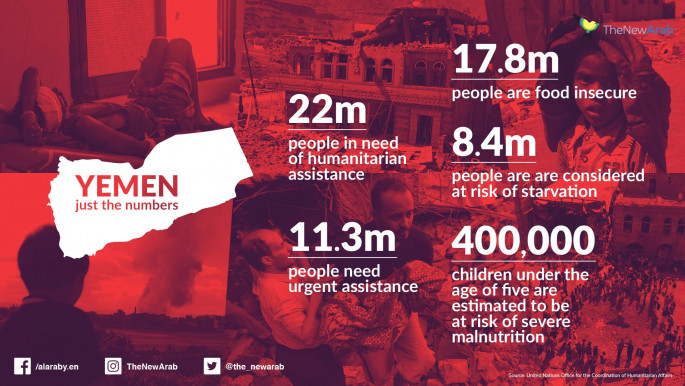'Nepotism, fraud, theft': UN agencies in Yemen plagued by corruption scandal
United Nations agencies operating in Yemen have been rocked by a corruption scandal as more than a dozen aid workers deployed to deal with the humanitarian crisis caused by a five-year civil war have been accused of embezzlement and malpractice.
The Associated Press obtained internal investigative documents revealing allegations that unqualified people were placed in high-paying jobs, hundreds of thousands of dollars were deposited in staffers' personal bank accounts, dozens of suspicious contracts were approved without the proper paperwork, and tons of donated medicine and fuel went missing.
Internal auditors from the World Health Organisation (WHO) are investigating the allegations.
A second probe by another UN agency, UNICEF, focuses on a staffer who allowed a Houthi rebel leader to travel in agency vehicles, shielding him from potential airstrikes by the Saudi-led coalition.
The individuals who spoke to the AP about the investigations did so on condition of anonymity, fearing reprisals.
 |
People were placed in high-paying jobs, hundreds of thousands of dollars were deposited in staffers' personal bank accounts, and tons of donated medicine and fuel went missing |  |
The main focus of WHO's investigation into its Yemen operations is Nevio Zagaria, an Italian doctor, who was chief of the agency's Sanaa office from 2016 until September 2018, according to three individuals with direct knowledge of the investigation.
The only public announcement of the probe came in a sentence buried in the 37 pages of the internal auditor's 2018 annual report of activities worldwide. The report did not mention Zagaria by name.
'Incompetent staff'
The report, released 1 May found that financial and administrative controls in the Yemen office were "unsatisfactory" - its lowest rating - and noted hiring irregularities, no-competition contracts and lack of monitoring over procurement.
WHO spokesman Tarik Jasarevic confirmed to the AP that the investigation is underway. He said Zagaria retired in September 2018, but he would not confirm or deny that Zagaria specifically was under investigation.
"The Office of Internal Oversight Services is currently investigating all concerns raised," he said. "We must respect the confidentiality of this process and are unable go into details on specific concerns."
Four current and former workers said the WHO's Yemen office under Zagaria was riddled with corruption and nepotism.
 |
|
Zagaria brought in junior staffers who worked with him in the Philippines and promoted them to high-salary posts though they were unqualified, three individuals said.
Two of them - a Filipino university student and a former intern - were given senior posts, but their only role was to take care of Zagaria's dog, two of the officials said.
"Incompetent staff with heavy salaries" undermined the quality of work and monitoring of projects and created "many loopholes for corruption", a former aid official said.
Zagaria also allegedly approved suspicious contracts signed by staffers with no competitive bidding or documentation for the spending.
According to internal documents, local firms contracted to provide services at WHO's Aden office were later found to have hired the staffers' friends and family and overcharged for services.
The owner of one firm was seen handing cash to one staffer, the documents show - an apparent kickback.
Under Zagaria, aid funds meant to be spent during emergencies were also used with little accountability or monitoring, according to internal documents.
Under WHO rules, aid money can be transferred directly into the accounts of staffers, a measure meant to speed up the purchasing of goods and services in a crisis.
The WHO says the arrangement is needed to keep operations going in remote areas because Yemen's banking sector is not fully functioning.
Because they are supposed to be restricted to emergencies, there is no requirement that spending of these direct transfers be itemized. Zagaria approved direct transfer of cash worth a total of $1 million for certain staffers, according to internal documents. But in many cases it was unclear how they spent the money.
'Scandalous'
UNICEF, another UN agency operating in Yemen, is also looking into allegations of wrongdoing by its staffers in the country.
According to three people with knowledge of the probe, internal auditors at UNICEF are investigating Khurram Javed, a Pakistani national suspected of letting a senior Houthi official use an agency vehicle.
That effectively gave the Houthi official protection from airstrikes by the Saudi-led coalition fighting the Houthis, since UNICEF clears its vehicles' movements with the coalition to ensure their safety.
Officials say they fear the agency's vehicles could be targeted by airstrikes if coalition forces believe they are being used to shield Houthi rebels.
Javed was well known for his close ties to Houthi security agencies; he boasted that he used his connection to prevent UNICEF auditors from entering the country, a former co-worker and an aid official said. The Houthi rebels even put up a large billboard of him on a Sanaa street, thanking him for his services.
Javed could not be reached for comment. UNICEF officials confirmed that as part of an ongoing probe, an investigative team had travelled to Yemen to look into the allegations. They said Javed has been transferred to another office but did not disclose the location.
According to several people who spoke to the AP, close ties between UN staffers and local officials on both sides of the conflict are common.
A confidential report by a UN panel of experts on Yemen, obtained by the AP, said Houthi authorities constantly pressure aid agencies, forcing them to hire loyalists, intimidating them with threats to revoke visas and aiming to control their movements and project implementation.
An official said the UN's inability or unwillingness to address the alleged corruption in its aid programs harms the agency's efforts to help Yemenis affected by the war.
"This is scandalous to any agency and ruins the impartiality of UN," the aid official said.
Agencies contributed to this report.



